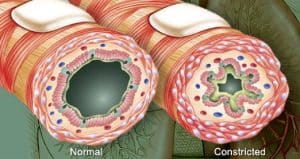Blog
Breathing Easier: How CBD May Aid in Asthma Management by Promoting Bronchial Dilatation
Asthma is a chronic respiratory condition that affects millions of people worldwide, causing recurring episodes of wheezing, shortness of breath, and chest tightness. While conventional treatments exist, researchers are exploring alternative approaches to managing asthma symptoms. One potential avenue is the use of CBD, a non-psychoactive compound found in cannabis. In this blog, we will delve into the potential benefits of CBD for asthma management, focusing on its ability to promote bronchial dilatation and improve respiratory function.
Understanding Asthma and Bronchial Constriction


Asthma is a chronic respiratory condition that affects people of all ages, causing recurrent episodes of wheezing, coughing, shortness of breath, and chest tightness. To comprehend how CBD may aid in asthma management, it is essential to understand the underlying mechanism of the condition. Asthma is primarily characterized by bronchial constriction, which refers to the narrowing of the airways due to inflammation and muscle tightness. When exposed to triggers such as allergens, pollutants, or exercise, the immune system of individuals with asthma overreacts, causing inflammation in the airways. This inflammation leads to swelling and constriction of the bronchial tubes, resulting in reduced airflow and the hallmark symptoms experienced by asthma sufferers. The muscles surrounding the airways also contract, further exacerbating the obstruction. Understanding the process of bronchial constriction is crucial in exploring potential therapies, such as CBD, that can help relax the airway muscles and reduce inflammation to improve respiratory function and alleviate asthma symptoms.
CBD and Bronchial Dilatation


CBD, short for cannabidiol, has been gaining attention for its potential bronchodilatory properties, which may aid in asthma management by promoting bronchial dilatation. Research in this area is still emerging, but early findings suggest that CBD interacts with the body’s endocannabinoid system, a complex network of receptors involved in regulating various physiological functions. Specifically, CBD activates certain receptors within the endocannabinoid system, which are known to play a role in inflammation and smooth muscle relaxation. By stimulating these receptors, CBD has the potential to reduce airway inflammation and relax the smooth muscles surrounding the bronchial tubes. This relaxation of the bronchial muscles can lead to bronchial dilatation, effectively widening the airways and improving respiratory function. While more research is needed to fully understand the mechanisms and effectiveness of CBD in promoting bronchial dilatation, these preliminary findings offer promising insights into the potential benefits of CBD for individuals with asthma. It is important to note that before considering CBD as part of an asthma management plan, individuals should consult with their healthcare provider to determine the most appropriate approach and ensure it aligns with their overall treatment strategy.
The Anti-Inflammatory Effects of CBD
Inflammation is a key factor in the development and progression of asthma, contributing to bronchial constriction and respiratory symptoms. CBD, a non-psychoactive compound found in cannabis, has gained attention for its potential anti-inflammatory properties. Research has shown that CBD can modulate the immune response and reduce inflammation in various conditions. By interacting with the body’s endocannabinoid system, CBD may help suppress the release of inflammatory mediators and promote a more balanced immune response. In the context of asthma, CBD’s anti-inflammatory effects may have a positive impact on airway inflammation, leading to improved respiratory function. While further studies are needed to fully understand the extent of CBD’s anti-inflammatory effects in asthma, the preliminary evidence suggests that it may offer a promising therapeutic avenue for alleviating inflammation and supporting better lung health in individuals with asthma. It is important to note that CBD should be used under the guidance of a healthcare professional, and further research is necessary to determine the optimal dosage and delivery methods for asthma management.
Exploring CBD Delivery Methods for Asthma Management
In exploring CBD delivery methods for asthma management, it is important to consider the diverse options available and their potential benefits. Inhalation methods, such as using vaporizers or nebulizers, offer direct access to the lungs, allowing CBD to act quickly on the bronchial tissues. This rapid onset of action can provide immediate relief during asthma attacks. However, it is crucial to note that the long-term effects of inhaling CBD are still being studied, and consulting with a healthcare professional is advisable to ensure safety and suitability for individual circumstances.
For those seeking systemic effects, sublingual administration or oral consumption of CBD oil, capsules, or edibles can be considered. Sublingual administration involves placing CBD oil or tinctures under the tongue, allowing the compounds to be absorbed through the mucous membranes and into the bloodstream. This method offers efficient absorption and convenient dosing control. Oral consumption, such as ingesting CBD capsules or edibles, allows CBD to be metabolized through the digestive system, providing longer-lasting effects. However, it’s important to note that the onset of action may be slower compared to inhalation or sublingual administration.
Choosing the right delivery method for CBD in asthma management should take into account individual preferences, medical history, and guidance from healthcare professionals. Additionally, it is crucial to ensure the quality and safety of the CBD products used, opting for reputable brands that provide third-party lab testing to confirm the potency and purity of their products. By exploring the various delivery methods and finding the one that suits your needs best, you can optimize the potential benefits of CBD for asthma management and support bronchial dilatation.
A Natural Approach
While more research is needed to fully understand the potential benefits of CBD for asthma management, preliminary studies and anecdotal evidence suggest its promising role in promoting bronchial dilatation and alleviating asthma symptoms. However, it is important to approach CBD usage for asthma under the guidance of a healthcare professional, considering individual factors and potential interactions with existing medications. By exploring the therapeutic potential of CBD and its ability to support bronchial dilatation, asthma sufferers may find additional relief and improved respiratory function on their journey to breathing easier.


